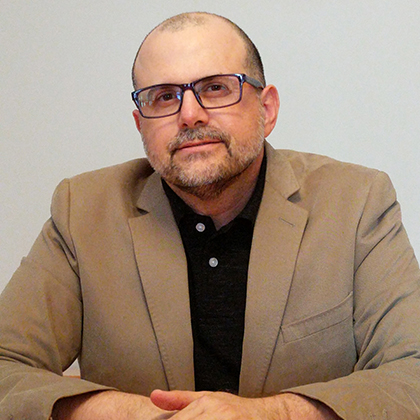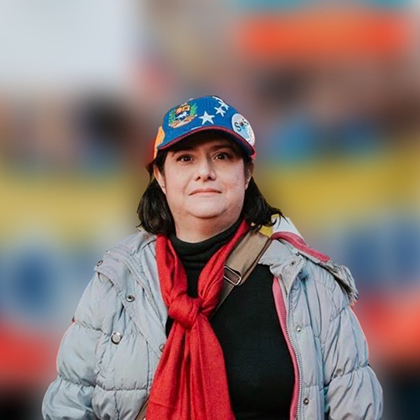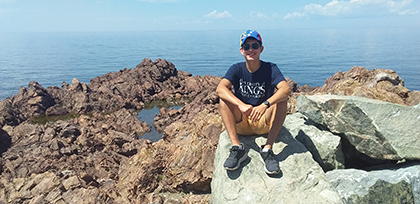Stories of spirit, hope and charity: Vibrant Venezuelans in Canada

They are artists, activists, educators, scientists, academics and students, a mix of ages, backgrounds and views, all united in their love and concern for the country they left behind.
The members of the vibrant community of Venezuelans in Canada are as varied as the stories that brought them to the country they now call home. They describe Canada as a place of diversity, tolerance and compassion, where they have the freedom to say what they want, live as they like and love whom they love.
As Canada prepares to host the International Donors’ Conference in Solidarity with Venezuelan Refugees and Migrants, they speak about their connections to their communities here and their efforts to help their friends and families back in Venezuela.
These are some of their stories.
Isaac Nahon-Serfaty – Academic

For Dr. Isaac Nahon-Serfaty, Venezuela was once a refuge. He was born in Morocco, where his ancestors, Sephardic Jews from Spain, had lived for centuries. With conflict in the region in the late 1960s, his family made its way to Venezuela when he was 6. They had relatives there, and “it was a very welcoming country, an open country, with a lot of opportunities,” he recalls.
Nahon-Serfaty first came to Canada for 2 periods in the 1990s to do his master’s degree and PhD at the Université de Montréal, taking classes in French, which he’d been taught by his mother. The Venezuelan government at the time encouraged young people to study abroad, under a scholarship program where they paid the same tuition as Quebeckers. Back home in Caracas, he became a journalist and consultant. Then he returned to Canada in 2007 to take a position at the University of Ottawa as a professor of communications, focused on health promotion, disease prevention and political communications.
Nahon-Serfaty and his wife, Cheryl Riera, an educator who is also from Venezuela, have become Canadian citizens. They have 3 grown children, 2 of whom continue to live in Canada and 1 in Spain.
In Venezuela, his mother, sister and extended family are “doing fine, but the situation is difficult,” Nahon-Serfaty allows. The cost of living is high, with everything paid for in U.S. dollars. “My mum may experience at least twice or 3 times a week a lack of running water or a blackout,” he says. “It’s a country where every institution, everything that you would think should be part of normal life—public services, hospitals, universities, public universities, the school system—has all been destroyed…This is a truly systemic crisis.”
People like Nahon-Serfaty who were educated through the country’s educational system “are now living everywhere in the world and contributing,” he notes. For example, he points out there are many Venezuelan engineers working in Alberta’s oil industry.
Meanwhile, most classes in public universities back home have been suspended for more than a year under the COVID-19 crisis. “It’s a terrible situation,” he says, although academics still try to conduct research and even teach.
“That’s the interesting side of it, you have part of society resisting, saying, ‘Okay, we should continue fighting, we should continue with some kind of normalcy,’” Nahon-Serfaty adds. He’s done his part to help by having 2 Venezuelan colleagues, 1 in the field of biology and the other in sociology, declared guest professors at the University of Ottawa so they can use its databases, journals and other resources. He’d like to have such privileges extended to more academics back in Venezuela.
Soraya Benitez – Singer

A call from her brother Pablo brought Soraya Benitez to Canada. He was studying at McGill University in 1997 and said the words that she’s agreed with ever since.
“Canada is you,” he beckoned. “It has your spirit.”
Benitez, an author, composer and performer working in a cultural management job for the municipal government in Caracas, did not have to hear more. She grabbed her guitar and flew to Canada, where “it was love at first sight, amor a primera vista in Spanish. I fell in love with the society and with its values,” she says. “I wanted to mix the cultural background that I brought with me with the Canadian culture; to make a new Soraya.”
Benitez began serenading passengers in the Montréal subway with her unique Venezuelan and world music. “It was the only place where I could sing without disturbing people, with my big voice,” she explains.
She’s since released 4 albums, and her performances are lauded by critics. A review in the New York Times noted Benitez’s “deep operatic voice, unusual arrangements and a surprisingly passionate mix of seriousness and sensuality.” Journal Le Canada Français in Saint-Jean-sur-Richelieu commented that “Soraya Benitez sings South America on a very personal note…The Venezuelan singer serves us rather deep music, intensely emotional and often tinged with melancholy, even sadness.”
While she sang and recorded her music, Benitez stayed in touch with a friend in Venezuela, a pediatrician named Olga Ortega, and over time “we just fell in love, like a good dish that you cook slowly,” she recalls. They began a romantic relationship 12 years ago and married in a ceremony at a friend’s home in Boucherville, Quebec, on December 9, 2017. It’s a milestone Ortega laments would “not be possible” in Venezuela. Adds Benitez: “It is not legal there, and even people who are in such a relationship have to hide it.”
Benitez has become a Canadian citizen, and Ortega, who came to live as a permanent resident of Canada in 2019, is going through the process to become one. She says that “every day I have concern for my family in Venezuela.” They send money home each week, and Benitez tracks the whereabouts of her siblings there on an app on her phone. They are dismayed at the exodus of Venezuela’s population and saddened at conditions for those who remain. “The food shortages, the quality of life, no electricity, no water, but above all, no freedom,” Benitez says.
She plans a fifth album, although that and public performances have been curtailed by the COVID-19 pandemic. Benitez meanwhile works as a customer-service representative for a company that provides training to people from Africa and Asia in fields such as public finance and risk management. Ortega is looking for a job.
They also volunteer in the effort to help Venezuela, “because Canada has shown me that we must live not only for ourselves, but also for others,” Benitez adds. “I learned humanism in this country.”
Rebecca Sarfatti – Community Builder

Statistics Canada reports there are 20,000 Venezuelans living in Canada, but Rebecca Sarfatti suspects there are many more. “Every day you meet new people that have just arrived, or people who have been here for a long time but you didn’t know them before,” she says.
One gets the impression Sarfatti wants to get to know them all.
She was born in Curaçao and moved to Venezuela as a teen. In 2002, she came to Canada with her husband, Eduardo Harari, an information technology consultant and journalist who had moved to Canada from Guatemala. They live with their 2 young children in Toronto.
There they find a lively Venezuelan community, with 2 cultural organizations, 6 restaurants and 3 food trucks. These serve items like arepas, a staple Latin American corn bread that inventive Venezuelan chefs fill with shredded beef or cheese, avocado and black beans.
She says Venezuelan Canadians are “saddened to leave their beautiful country” but have no choice. “Young people have no future there,” says Sarfatti, who is a permanent resident of Canada. “They come to this country to study, work hard and become productive as fast as possible.”
A political science graduate, today she volunteers full time as a “community builder”. In 2007, Sarfatti created Venezolanos en Toronto, a social organization that currently has more than 12,000 members on Facebook and other social media platforms. She’s a co-founder and board member of the Canada Venezuela Democracy Forum, which was formed in 2014 and especially focuses on addressing the political and humanitarian crisis back home.
It collects donations of medical supplies and equipment, which are sent to a network of doctors in Venezuela’s public system at their homes, to keep under the radar so they don’t get in trouble from the government. Between shipments, Sarfatti’s living room fills with the materials, which have included artificial limbs, intravenous tubes and a box of metal speculums for gynecological examinations. “They don’t use them here anymore, they use plastic. But in Venezuela they just clean them and use them,” she explains.
Hospitals there “are falling apart; you would think there was a war,” she comments. “There isn’t water, reliable electricity or medications. The air conditioning doesn’t work in surgeries, and the system for dialysis has collapsed.”
The boxes today include masks, gloves and gowns to help prevent the spread of COVID-19. She says the virus has killed more than 300 physicians in the country.
Sarfatti is often asked to post “crowdfunding” appeals online to help individuals and families there because “somebody has cancer, somebody has COVID. And I’m talking all levels of people.”
Her mother, 74, lives in Caracas, and Sarfatti calls her every day. “I can still feel, smell and hear the noise of my city,” she says. Like many Venezuelans in Canada, she sends funds home. “But sometimes I have to say no, because financially we cannot support everything. I wish I could.”
Mauricio Rico Quiroz – Student

Mauricio Rico Quiroz got his first glimpse of Canada at the age of 6, on a TV show for kids that had images of totem poles and red maple leaves. His father got out a map and pointed to the vast country, and the young child planned to visit it one day.
He started to make that happen a decade later, volunteering for Interact, the youth wing of Rotary International. Rico Quiroz learned about the organization’s foreign exchanges for high-school students “and Canada was definitely my pick.”
However, it was a 2-way program, and Rico Quiroz lived in San Cristóbal, Venezuela, near the border with Colombia. A narrow bridge there is one of the points of departure for refugees leaving the country. “We would see people crossing every day from all over the place in Venezuela, from Caracas, from my city and from the interior.”
He worried there was no way a Canadian high-school student would be sent to his troubled country as part of the Rotary exchange. Rico Quiroz wrote letters to chapters of the organization across Canada asking to simply come to study in Canada and heard back from one in Newfoundland and Labrador that had forwarded his request to a group in Dartmouth, Nova Scotia.
“They said, ‘Yes, we have a spot for you. We’re not hosting any exchange students this year, so we’re going to take you here.’”
Rico Quiroz arrived in Canada in September 2019 and loved his year at Dartmouth High School. The families he stayed with were welcoming and “super helpful”, he says. “With Canadians it’s easy to feel part of the culture. It is a very open country, and the mindset toward diversity and inclusion is very good here.”
Canada’s scenery “went beyond my expectations,” he comments. There was an “indescribable” visit to Cape Breton Island to see the autumn colours. Rico Quiroz even relished the Canadian winter, going skating, skiing and snowshoeing.
“A lot of people who’ve always lived in the cold don’t like it, but it’s something I just don’t get tired of,” he says. “In Venezuela, we have eternal summer. It’s always between 20 and 30 degrees.”
Toward the end of the school year, the Rotary clubs in the region offered to sponsor Rico Quiroz on a 4-year student visa. He enrolled at Dalhousie University as an economics major and took his first year of classes virtually.
He’s travelled around the Atlantic provinces, making presentations to 17 Rotary clubs talking about the situation in Venezuela and would like to see more of Canada.
Now 18, Rico Quiroz misses his family, but stays in touch through FaceTime and worries about the situation there. There’s a small Venezuelan community in Eastern Canada, and he loves meeting people from home. Rico Quiroz says Venezuelans know each other by the way they speak Spanish. “In all of Latin America, people recognize us for our accent because it sounds like we’re singing while we're speaking. We’re very musical in Venezuela.”
- Date modified: